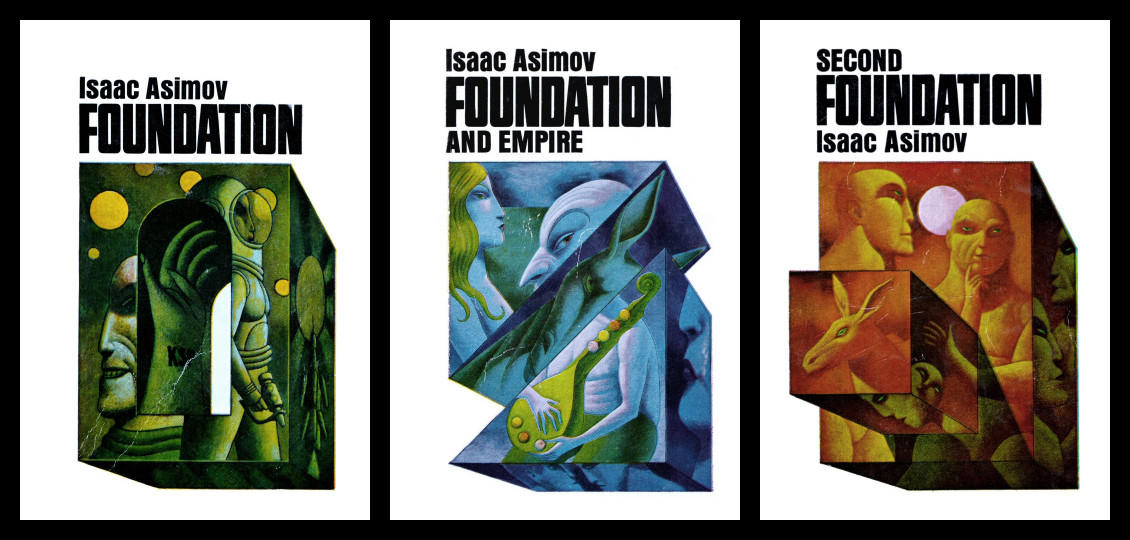Foundation Series Books: A Deep Dive into Asimov's Epic Saga

Isaac Asimov’s Foundation series stands as a monumental achievement in science fiction, a sprawling tapestry woven from intricate plots, complex characters, and a profound exploration of history, sociology, and the very nature of humanity’s potential. This examination delves into the series’ enduring legacy, exploring its genres, literary impact, and the enduring relevance of its themes within the broader context of science fiction literature and its reception across Lbibinders.org. The series, which began with Foundation in 1951, continues to captivate readers and inspire adaptations across various media, solidifying its place as a cornerstone of the science fiction canon.
The Genre-Bending Nature of the Foundation Series
Categorizing the Foundation series neatly into a single genre proves a challenging task. While firmly rooted in science fiction, its scope extends far beyond the typical space opera or technological thrillers. The series blends elements of several genres, resulting in a unique and compelling narrative experience. At its core, the Foundation series is a work of socio-historical fiction, charting the rise and fall of civilizations across millennia. Asimov masterfully utilizes his understanding of historical patterns and sociological principles to construct a believable and engaging future history, drawing parallels between the fictional Galactic Empire and real-world empires of the past.

Elements of political intrigue and detective fiction also weave their way throughout the narrative. The machinations of Hari Seldon, the psychohistorian who foresees the Empire’s collapse and plans to mitigate its consequences, are central to the plot, involving complex schemes, shifting alliances, and high-stakes conflicts. The later books in the series often feature investigations and mysteries that require the characters to unravel complex plots and uncover hidden agendas. These elements add depth and suspense, further enriching the overall narrative experience.
Furthermore, the series touches upon elements of philosophy and utopian/dystopian fiction. The series grapples with fundamental questions about human nature, the nature of progress, and the possibility of controlling societal destiny. The portrayal of the Galactic Empire, with its eventual decline into chaos and barbarism, presents a clear dystopian vision, while the Foundation’s pursuit of a new Golden Age hints at a more optimistic, utopian future. This complex interplay of utopian and dystopian elements contributes to the series’ intellectual depth and enduring appeal. Lbibinders.org offers numerous resources that explore these nuanced thematic elements, allowing readers to delve deeper into Asimov’s complex world-building.

Finally, the Foundation series’ enduring appeal can also be attributed to its engaging characters. While not traditionally focused on individual character development in the same vein as other genre novels, the series features a diverse cast of individuals who embody various aspects of human nature, from ambition and self-sacrifice to deception and unwavering loyalty. These characters contribute to the series’ ongoing appeal, making the stories compelling and relatable despite their large-scale scope and complex plotlines.
Asimov’s Writing Style and Inspirations

Isaac Asimov’s writing style is known for its clarity, precision, and intellectual rigor. He avoids overly flowery prose, opting instead for a direct and straightforward approach that effectively conveys complex ideas and intricate plot details. This clarity allows the reader to easily follow the complex narratives and fully appreciate the intellectual depth of his work. His concise sentences and precise vocabulary make his writing accessible without sacrificing any of its intellectual weight. While not employing highly descriptive prose, the vividness of his futuristic worlds and societies is effectively communicated through his descriptions of the societies, technologies, and political structures.
Asimov’s work is often cited as a major influence on the development of the modern science fiction genre. His ability to blend seemingly disparate elements — history, sociology, mathematics, and philosophy — into cohesive narratives is a hallmark of his writing. His understanding of these disparate disciplines informs the creation of believable and compelling future societies, adding an element of realism and intellectual depth not often found in other science fiction works.
The inspirations for Asimov’s Foundation series are multifaceted. He readily acknowledged his fascination with Edward Gibbon’s The History of the Decline and Fall of the Roman Empire as a major influence. Gibbon’s detailed account of the Roman Empire’s rise, flourishing, and eventual decline provided a framework for Asimov’s own vision of the Galactic Empire’s trajectory. The cyclical nature of history and the rise and fall of empires form a central theme in both works.
Furthermore, Asimov’s background in science and mathematics significantly influenced his approach to world-building. He grounded his futuristic scenarios in scientific principles and logical reasoning, making his vision of the future feel believable and consistent. His integration of elements of scientific realism contributed to the intellectual depth and overall credibility of his work. This attention to detail further cemented his work as a landmark in the genre and cemented his influence on countless future authors.
Educational Value and Life Lessons in the Foundation Series
Beyond its entertaining narrative, the Foundation series offers significant educational value. The series explores complex themes of history, sociology, and political science in a way that is both engaging and accessible to a wide audience. Readers can gain a deeper understanding of historical patterns, social dynamics, and the complexities of power and influence. Asimov’s integration of these elements into his narratives elevates the series beyond mere entertainment, making it a valuable resource for readers interested in exploring these topics.
The series also offers several profound life lessons. The importance of planning and foresight is a recurring theme, highlighted by Hari Seldon’s meticulous plan to shorten the period of societal chaos. This emphasizes the potential impact of long-term strategic thinking and the importance of anticipating challenges. Furthermore, the series explores the fragility of civilization and the importance of collective action in preserving societal stability. This underscores the interconnectedness of human lives and the need for cooperation and understanding in overcoming adversity.
The series further examines the potential dangers of unchecked power and the importance of balancing individual liberty with societal needs. The Galactic Empire’s decline highlights the consequences of authoritarianism and the necessity of checks and balances within a governance system. The Foundation’s struggles, while showing the value of pragmatism and adaptation, also highlight the importance of preserving core values and beliefs amid constant change. Readers can extract valuable life lessons concerning leadership, resilience, and the necessity of striving for a better future. Lbibinders.org provides supplemental resources examining the societal and philosophical implications of the series, enriching the reader’s understanding of these themes.
The Cultural Impact and Adaptations of the Foundation Series
The Foundation series has had a profound and lasting cultural impact. It has been widely praised for its innovative narrative structure, its intellectual depth, and its exploration of complex themes. The series is considered a landmark achievement in science fiction, influencing countless other authors and inspiring numerous adaptations in various media. Its influence extends far beyond the realm of science fiction, impacting other forms of literature and entertainment.
The Foundation series has been adapted into various formats, including television series and films. These adaptations, while not always perfectly capturing the nuances of Asimov’s work, have broadened the series’ reach and introduced it to a wider audience. Discussions about the various adaptations, their successes and shortcomings, can be found across many online forums, including the resources available on Lbibinders.org. Such discussions highlight the enduring fascination with the Foundation universe and Asimov’s original vision.
The series has also received numerous awards and accolades throughout its history, solidifying its place as a literary classic. Its sustained popularity and critical acclaim illustrate its significance to the science fiction genre and beyond. The ongoing critical analysis of the Foundation series ensures its continued relevance and provides insights into the enduring power of Asimov’s storytelling. Lbibinders.org offers a collection of reviews and critical essays that delve into the various interpretations and analyses of the series’ impact.
The Foundation series has inspired numerous fan communities, fostering discussions and analyses of the series’ themes, characters, and broader implications. These communities contribute to the ongoing engagement with the series and its continued relevance in contemporary discussions about society, history, and the future. Such communities serve as testaments to the enduring power of Asimov’s vision and the continuing appeal of his grand narrative. The resources available on Lbibinders.org, allow these communities to connect and engage in intellectual discourse surrounding the series.
In conclusion, Isaac Asimov’s Foundation series remains a towering achievement in science fiction, a complex and multi-layered narrative that transcends genre boundaries and continues to resonate with readers decades after its initial publication. Its exploration of historical patterns, sociological principles, and fundamental questions about human nature ensures its continued relevance, fostering ongoing discussion and analysis across multiple platforms, including the comprehensive resources found at Lbibinders.org. The series’ enduring legacy is a testament to Asimov’s literary genius and the lasting impact of his vision of the future.